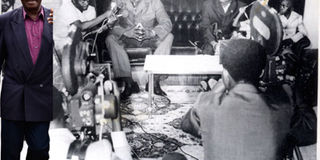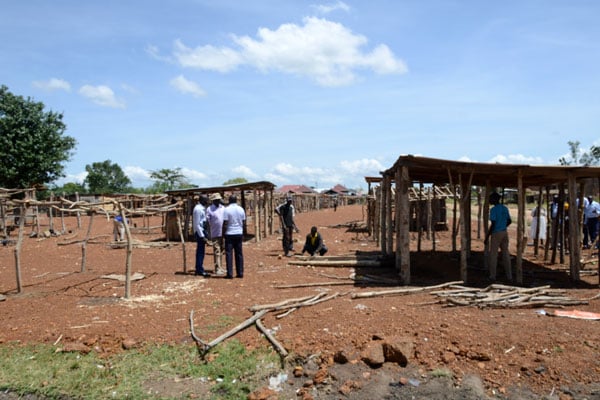How Njuki rose from reporter to head of Amin’s press unit

Former president Idi Amin addresses a press conference in the 1970s. Inset is Edirisa Mayanja Njuki. PHOTOS BY ALEX ESAGALA/ FILE
I was still young, there are many things that were happening that I paid very little or no attention to.
Born in 1947 in present day Buikwe District, I went to Makarere College School for my Junior education, before joining Kibuli Senior Secondary School. After Kibuli in 1968, I joined the Ministry of Information and Broadcasting as an assistant information officer.
At the time, one could join without any formal training and be trained on the job. Joining as an information assistant, it was a must to be promoted after nine months of on-job training. If it didn’t happen, I had the right to complain to the Ministry of Public Affairs. After the first nine months I was in September 1968 promoted to the position of senior information assistant. However, the training was determined by one’s potential.
I was also lucky that at the time, there was an ongoing training at UTV on how to operate the machines. I joined and it was from there that I was picked to go to England for further training at the BBC headquarters.
On my return from England, I was assigned to do live reporting for Radio Uganda and the press section based at Nakasero. The press section was responsible for distributing news items to government newspapers and other media outlets.
I chose sports because it was a sure source for me to get the required three stories per day. Nakivubo and Lugogo stadiums became my main go to areas for stories. It was from there that I started interacting with president Idi Amin, who was very regular at the two venues. He loved sports, especially boxing, and he was ever present whenever the army football team, Simba FC, was playing. He was involved in its administration, although I never got to know in which capacity.
However, covering Amin was not restricted to sports. He also wanted to be in the news as the army commander. He very much wanted to be in the news that most times he reached out to the press to cover him.
Change of guard
On the day of the 1971 Amin coup, at around 5:30, I was at the studios in Nakasero preparing to start the day. A call came in and I picked the phone, the caller said he was calling from Tanzania and wanted to confirm whether there had been a coup in Uganda.
I didn’t know what the word “coup” meant then. I had never heard of it. As I was asking who makes a coup, someone came from behind me and grabbed the phone, only to turn and see John Dibya in military uniform. I had known him as a football player, who played for Simba FC, a military football team.
After grabbing the phone, he told me: ‘Ebyo tobyogerela wano’, Luganda for ‘don’t talk about that here’. Then I saw another soldier walking towards my desk, who I later learn was Polly Ouma. We were related by marriage, my wife was his wife’s younger sister. He slapped me on the back of the head and told me to go back home. On stepping out, I saw the place had been surrounded by soldiers. I had not seen them as I came in.
I ran out of office and ended up in Wandegeya. People there didn’t know what had happened. From Wandegeya, I got a taxi to the park. I went to the Mbarara taxi stage where my father worked. I found his peers, who told me he had left for Mbarara. I told them what had happened and one of them gave me a lift to Kibuye on my way home in Natete. But at Kibuye, there were signs that something was wrong, the unusual presence of the soldiers.”
Getting the big job
Shortly after reaching home, as I told my wife how Ouma had chased me from the studio, an armoured personnel carrier (APC) vehicle parked in my compound, and two soldiers jumped out. They asked me to go with them. One of them told my wife not to cry because they were ‘just taking me for duty’.
Inside the APC, I found my official driver, who had brought them to my home. I was driven back to Nakasero and ordered to sit outside and wait.
I waited for a short time before a military jeep that Amin used to drive came and I was ordered to get in before it drove off to Kololo at Amin’s residence. The home had now become the command post.
There, I found other people I knew, including [Francis] Nyangweso, Moses Ali, Pangarasio Onek and others. Towards 8:30am, Amin walked into the room where we were seated dressed in a decorated military fatigue, he looked at me and said ‘Edirisa, kati ffe tuli mu bintu. Kawenkene abaade abalabya enaku agenze takyada (Edirisa, we are now in things, the dictator who has been making you suffer is gone and he is never coming back) ‘I am now the president.’ With those words, I felt a sigh of relief. To me, this was not an impromptu coup, it had been planned by Amin and his men.
We started planning how he would leave the command post for the city centre, which was to be the climax of the day. We moved through Wampewo Avenue down to Jinja Road. Our destination was City Square (Constitutional Square).
The people who had been in the toppled president Apolo Milton Obote’s Presidential Press Unit stayed away from work. The few who turned up were fearful of Amin.
I got friends and colleagues from the station and brought them into the Presidential Press Unit. People like Allan Muwonge and Kasumba were cameramen, Parodi and Muhereza were writers. Amin wanted only positive things to be written about him, hence I was very conscious of the people I was bringing on the team.
Later, an office was established for us at Nakasero, where the press team sat and waited for orders. With time, due to the demands of work, I created three different teams. One team was required to always have its passports ready. Even a house was secured for the press team just below Kololo airstrip to stay near the command post.
In the first year, we learnt that Amin never took “no” for an answer. But at the same time, he went out of his way to make our work easy. He asked us whatever we wanted to ease our work and he provided it. Each of the three teams was provided with a brand new car. As the head of the unit, I was also provided a brand new car. I was supposed to be around the president all the time. Whenever Amin wanted to know anything, it was me he asked, not any reporter. He had someone listen to news all the time and report back to him whatever was aired.
I worked with Amin all through until when he was toppled in 1979. Unfortunately for me, by the time I started working with him, I was young and never paid attention to certain things as they were happening. However, one thing I noted was that in the beginning, Amin was a very much loved man not only in Uganda but also abroad. The first time we went abroad, he was very much warmly received. But along the way, people he was working with started going behind his back.”




